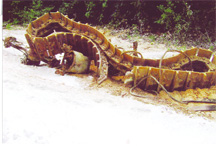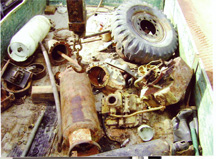Malaysian-Guyanese owned logging company UNAMCO is currently a shell of its former self and will likely permanently wind-up its logging operations, although it may still be able to run its sawmill.

In a recent interview with Stabroek News, one of the company’s advisors Hamley Case said UNAMCO had fallen on hard times; crippled by government’s non-renewal of its lease it has recently been raided by bandits who removed most of its equipment for scrap metal.
UNAMCO was a joint venture between local company Case Timbers, owned by Hamley Case and the Malaysian company, Tenaga Khemas owned by Malaysian businessman Villupillai Kanagalingan. In this venture, 85 per cent was owned by the Malaysian investor and 15 per cent by Case Timbers. The company was granted a Timber Sales Agreement (TSA) concession in 1994, for 237,000 acres located about 50 miles south of Kwakwani.

Case explained that the joint venture was done with the encouragement of then president Dr Cheddi Jagan.
Since the company’s lease expired on January 9, 2006 it is yet to be renewed. According to Case, who at one time served as the managing director of UNAMCO, the company has been trying since then to get the lease renewed but this has been met by the royal runaround. He said
 that over the years, meetings with Minister of Agriculture Robert Persaud and the Commissioner of the Guyana Forestry Commission (GFC) James Singh have proved futile.
that over the years, meetings with Minister of Agriculture Robert Persaud and the Commissioner of the Guyana Forestry Commission (GFC) James Singh have proved futile.
Case said meetings had been held between officials from UNAMCO and Singh and Persaud, the last of which was on March 20, last year. Stabroek News was unable to contact Persaud as he is not in the country.
And when this newspaper attempted to contact Singh, he said he was in a meeting and unable to speak at that time.
However, Case emphasized that the problems of the company have been compounded by a recent attacks by a gang of bandits.
He said the since the company was expecting the release to be renewed, it did not remove all its equipment out of the forests.
Recently, armed bandits have been entering the concession, stealing the equipment and cutting them up and he said he had learned from reliable sources that they were being sold as scrap metal. He said that although some amount of security was provided, the guards were no match for the bandits.
Case said these attacks have come to the fore since late last year, and have grown from petty theft to vicious attacks at present. He said that the police have been doing a decent job and recently apprehended one of the persons who was believed to be a top man in the gang of bandits.
But he said despite being informed neither the Agriculture Ministry nor the Forestry Commission have responded. This newspaper was shown drafts of letters sent to both of these institutions.
Additionally, Case said, the bandits have destroyed bridges and have done significant damage to the $4 billion investment in infrastructure that the company has made over the years. Case said he doubted that even if the lease were to be approved now, the business could continue as before. He said the company had lost the most of its equipment and as such would have to invest more in acquiring additional equipment. He said the company had already invested substantially in the equipment back in 1996, when the company began its operations.
Case said the possibility exists that the company might be able to put its sawmill to use if it bought logs from other loggers in the area. Meanwhile, he said that since the company was not in operation, it had to get rid of the majority of its 200-odd member staff.
The company is now run by Acting General Manager Ramesh Kumar, who, Case said, spends the majority of his days trying to halt the ongoing banditry and vandalism.
He said though that the treatment of the government has perhaps permanently ruined future investmens by Malaysian companies in Guyana.
